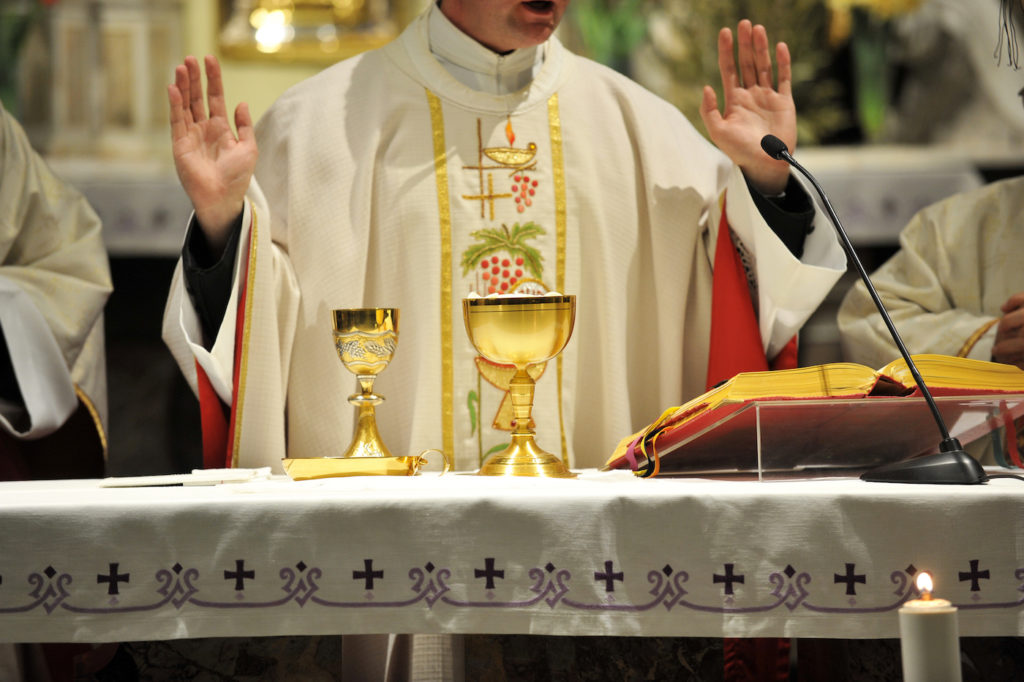In 2019, a gunman opened fire in a Walmart store in El Paso, killing twenty-three people. The local parish priest was a man who had been ordained barely two months before. A year before that, a priest from a large rural diocese who had been ordained for just two years was asked to serve as the pastor of a cluster of six parishes, most with rapidly dwindling populations. This past year, newly ordained priests all over the world had to negotiate the first months of their priesthood by serving the Body of Christ as it faced severe physical and emotional isolation from family, friends, and even churches.
I am the rector of a Catholic diocesan seminary, and all of these scenarios were experienced by recently ordained graduates. Rectors of other seminaries could share similar accounts.
Compared to the relative order and structure of the seminary world, the world new priests are plunged into can be chaotic, because everyday life is neither scripted nor predictably controlled. The degree to which a man can flexibly adapt to such changes while remaining true to his priestly identity provides a measure of the relative success of his seminary formation. A parish priest who is inflexible and rigid—whether in his personality, his ideology, or his spirituality—will almost certainly fail to be a true bridge to Jesus Christ for others.
I describe here some of the ways that Catholic seminaries today are addressing these challenges in response to the needs of an ever-changing landscape in American parishes.
Start your day with Public Discourse
Sign up and get our daily essays sent straight to your inbox.A parish priest who is inflexible and rigid—whether in his personality, his ideology, or his spirituality—will almost certainly fail to be a true bridge to Jesus Christ for others.
Developing Affective Maturity
Since at least the time of the Second Vatican Council, the various documents of the Church that address priestly formation have consistently stressed that a man’s human formation (i.e., the degree to which he is emotionally, psychologically, and physically healthy) provides the necessary foundation on which his spiritual and intellectual formation must rest.
The term “affective maturity” is used to describe the seminarian’s ability to properly recognize and integrate his emotions into his assessment of, and reaction to, a given situation or encounter. As the term implies, affective maturity encompasses the capacity of a man to responsibly acknowledge what he is feeling without being controlled by his visceral reactions to those feelings. It requires a high degree of self-knowledge and a willingness to honestly name and address one’s own history and vulnerabilities.
A man must possess affective maturity to discern a priestly vocation freely and fully. This quality is so central to priestly formation that St. John Paul II noted: “affective maturity, which is the result of an education in true and responsible love, is a significant and decisive factor in the formation of a candidate for the priesthood.”
What John Paul II highlighted nearly thirty years ago is just as critical today—if not more so. A more recent document on priestly formation notes: “The lack of a well structured and balanced personality is a serious and objective hindrance to the continuation of formation for the priesthood.”
Contemporary Challenges
Unfortunately, contemporary American culture does not generally encourage young adults to become self-reflective and aware of the impact that their emotions have on their decisions and relationships. Our society seeks instant gratification and rejects anything that is perceived as critical or challenging. The effects of this atmosphere present new challenges for today’s seminaries. So, too, does the high degree of broken family structure in our society. Many young men who are beginning to discern a priestly vocation are dealing (or not dealing) with the impact of parental divorce. Others have never had a healthy paternal role model in their life.
None of these challenges need preclude a priestly vocation, per se. However, if they are not recognized and addressed early in the discernment process, they can produce insurmountable obstacles to a man’s freedom, preventing him from fully engaging in formation. If, for example, a man is harboring a narcissistic personality, carrying the weight of never having addressed his parents’ broken marriage or a hidden addiction, or struggling to relate in a healthy way to women, then healing in these areas must begin before he can freely live the roles of shepherd and servant. These wounds must be addressed so that he can be free to embrace self-sacrificial love modeled after the heart of Christ.
Seminary faculties recognize these potential dangers and have taken a number of steps to address them. Upon applying to the seminary, each man undergoes an extensive psychological evaluation to help determine such qualities as his degree of emotional maturity and psycho-sexual development, and to screen for any addictions or pathologies. These evaluations are useful for helping to determine whether a man is fit to begin priestly formation. The seminary is not the place for extended therapy or extensive psychological treatment. Any such needs should be addressed before a man even begins a seminary program.
That being said, psychological and counseling services do play a pivotal role in contemporary seminary programs. The use of individual counseling sessions, as well as detailed presentations by psychology professionals to both the faculty and student body, are frequently integrated into priestly formation. Because accurate self-knowledge is a critical component of attaining affective maturity, psychological services can be invaluable for helping a man to uncover any personal issues that need to be addressed. Psychological counseling complements and reinforces the work of spiritual directors as they accompany a seminarian along his vocational path.
Psychological counseling complements and reinforces the work of spiritual directors as they accompany a seminarian along his vocational path.
The Power of Encounter
Again, the goal of acquiring affective maturity is to help the seminarian integrate his emotional responses in a healthy way. The fruit of that maturity is both developed and manifested through the seminarian’s encounters with others. Indeed, priestly formation consists of constant experiences of encounter, interspersed with time for intellectual and spiritual processing and integration.
It is important to remember that “encounter” does not only mean interacting with another person. A seminarian also encounters the rich, living tradition of the Church. Thus, theological education becomes a dialogical process, whereby the student increasingly knows and loves the Lord because he engages the text or theological argument before him. He pays attention in the classroom to what is stirred up inside his own mind and heart through that encounter. He then brings it into both his personal study time and his personal prayer time to be further enlightened by God’s response to his own observations.
This is a very different pedagogy from one in which the professor is simply seen as a “sage on the stage” who pours his content ready-made into the minds of his students. There is a growing awareness of this dynamic among seminary faculty, and it is producing innovations in the classroom. Consider, for example, the increasing popularity of “flipped classrooms,” in which students are responsible for absorbing material outside of class time and then presenting that material to each other.
Yet authentic encounter can easily be thwarted if a seminarian’s point of view is hijacked by a singular perspective or opinion. This is often the result of social media consumption. Given the highly charged and divisive political and socio-economic landscapes in this country, we ought not to be surprised that a similar polarization is threatening the Church. Seminarians—and, yes, some faculty—can be easily swept up in polemical rhetoric that pits “liberals” and “conservatives” against each other on everything from liturgy to sacramental theology to politically charged social issues. Even if the seminary formation team strives to present a balanced, orthodox understanding of Church teaching, along with a healthy respect for the ecclesial leadership, there is no shortage of divisive voices that stream in daily via social media. These sow seeds of doubt and mistrust among seminarians. These media outlets can create a de facto “shadow formation” that wields immense influence.
Thankfully, seminary faculty are becoming more and more direct about confronting these divisive voices and exposing their lies and manipulations. For example, shortly after the release of Pope Francis’ Amoris Laetitia, our seminary held a “teach-in” at which faculty members from different departments (systematic theology, sacred scripture, pastoral theology, and a spiritual director) each presented on the document before the entire seminary community. They directly engaged both each other and the text, not shying away from controversial passages or questions. They modelled for the students how to read a text critically and how to debate legitimate theological questions in a healthy way, without descending into the angry screeds about the document that were so prevalent on social media at the time.
Authentic encounter can easily be thwarted if a seminarian’s point of view is hijacked by a singular perspective or opinion.
Forging Relationships
Similarly, seminaries should foster opportunities for students from differing cultures and backgrounds to become more than just a social community. Seminarians should strive to form relationships that are centered on Christ, build abiding trust, and create a space in which they can be open and vulnerable about their struggles and fears. Such relationships do not come easily. They require great intentionality and patience to nurture. Seminary formation advisors and spiritual directors can provide important support to help a man initiate and sustain those connections. To this end, some seminaries have begun to assign seminarians to small prayer and support groups. By meeting regularly for prayer and discussion, the members of these groups grow in their ability to form substantial and authentic community.
Beyond the seminary, students should be encouraged to encounter the Body of Christ in every form possible. They should actively seek out others with whom they are comfortable as well as those whom they find difficult to understand. During the school year, seminarians are sent to parishes or other pastoral sites to engage in activities such as teaching, helping with liturgies, or visiting the sick and homebound. Some formation programs require that a man spend an extended period in full immersion at a parish in his diocese. During summer months, many seminarians undertake language study in foreign countries. Throughout these experiences, the seminarian should seek to engage the full demographic spectrum before him: differing languages and cultures, old and young, male and female. He should observe how he respects others’ authority and exercises his own.
Ideally, in all of these encounters, the seminarian will bring his experiences back to his program of priestly formation to process them with the Lord in prayer, and with his formation advisor, spiritual director, and teachers. Any experience that is not reflected on provides a poor avenue for growth in affective maturity. When priestly formation is done well, however, encounters with others become thresholds rather than barriers.
Our goal should be to ensure that all the priests ordained from our seminaries will possess the flexibility and affective maturity to live and thrive as holy shepherds and spiritual guides, skillfully navigating the tensions to which their ministry will inevitably expose them. And, we hope and pray, they will do this without compromising the eternal truths of the faith, always seeking to conform their lives to Christ.













